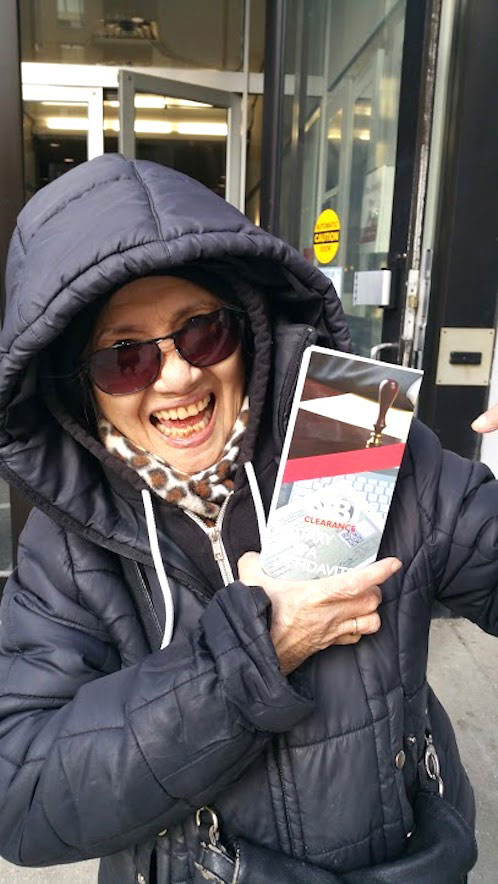A ‘Kumusta na?’ warms newcomers in wintry Toronto

Rain or shine, snow or gusty winds, will not keep Elenita Evangelista from the job she loves: greeting and providing help to those new to Canada. INQUIRER/Patty Rivera
TORONTO— With a warm “Good Morning!” Elenita Evangelista greets visitors to the building that houses the Philippine Consulate in this city and directs their inquiry with a smile.
For newcomers, that is all they need to get settled and connect to their new country. A few words of hello and “Kumusta na?” and a smattering of Pilipino, Pampango, Bicol, Cebuano, or Ilocano soon enough could spark conversations.
Elenita had been hired by a lawyer with an office close to the Philippine Consulate in Toronto to help visitors find their way into the various offices at 160 Eglinton East, from the Social Security and Philippine Overseas Development Board offices on the second floor to the Philippine Consulate, which occupies the seventh floor.
Not that Elenita has to work because she needs a job.
Her children can afford to keep her and her husband, Ruben, comfortably settled in their house in Pickering. Her daughter, Ranielyn, works in financial services while her son, Ruben Jr., an IT consultant with a high-paying job prefers to stay back in Manila. But Elenita wants to maintain her independence and earn her keep for as long as she can even in retirement.
“Working here for a few hours each day keeps me alert and busy. I can also help newcomers with their errands. Secure a work permit, get their passport, follow up on their social security. I love this job.”
Flashback to the sixties in Manila. Elenita, then 20, had just completed her biological science degree from the University of the East and had been offered a teaching post. She wasn’t a few months into teaching when her father suddenly died.
At the wake, the president of the Philippine Refining Company (since renamed after its parent company, Unilever) where her father worked offered help. He asked the bereaved family if there was anyone in the family who would like to replace their father. The company in fact had a program that encouraged the hiring of next of kin to help its employees.
The exigencies of those times were paramount to young Elenita’s mind. The middle child of seven children, she had to think of her younger siblings still in school. Instead of teaching, she opted to join the workforce at PRC-Unilever. She worked in the documentation office for 40 years.

Newcomers to the Philippine Consulate building in Toronto are greeted by Elenita Evangelista, who offers information about the offices at 160 Eglinton Avenue East building. INQUIRER/Patty Rivera
During her last decade with the company as documents controller, she worked on putting together all the papers needed to enable the company to acquire an ISO number. The International Standards Organization or ISO number provides common international standards between countries, from manufactured products and technology to food safety, agriculture and healthcare. The standards aid in the creation of products and services that are safe, reliable and of good quality.
Elenita knew how the standards enable products from different markets to be directly compared. The ISO also protects consumers and the end-users, ensuring that certified products and services conform to the minimum international standards.
Elenita worked relentlessly and into the night sorting facts and statistics to provide the company all the documentation it needed to apply for an ISO file. Her perseverance paid off; the company filed for and acquired its ISO number.
At her retirement party in 2000 Elenita, then 60, saw her photo unveiled in the company’s hall of fame. “Even the wife of the company president came all the way from Boston to give me a bouquet of flowers,” she beams with pride. “And my division knocked off work early to give me a surprise send-off. I couldn’t believe they would do it all for me!”
Born of an Ilocano father and a Pampagueña mother, Elenita knew resilience from Day One.

Elenita Evangelista greets and guides visitors to the Consulate’s offices at 160 Eglinton Avenue East building. INQUIRER/Patty Rivera
During the Japanese Occupation, her parents fled to Lubao, Pampanga, to seek shelter from the war. Her grandfather had dug deep into their silong, or crawl space, where he hid his family during aerial dogfights or bombardments.
“My Lolo had a papag (a low bed) made out of bamboo, a small table and mats where we lay down for the nights of dogfights. It was not easy living during the Second World War.” Sometimes she helped by catching frogs and eels from the rice paddies, or sifting tulya or clams and tiny shrimps by diving deep in the waters at the bottom of the Pampanga River.
From the fruit trees in their backyard, she would fetch guavas or caimito or santol. “We survived through the war years living off the land and after Liberation went back to settle in Sta. Mesa.”
Those days of toil and survival are behind her now.
Here in Canada, where Elenita and her husband had migrated after their daughter asked them to help care for her young brood, life is another journey. It has been seven years since they came, and in six of those she has held a job assisting new immigrants.

